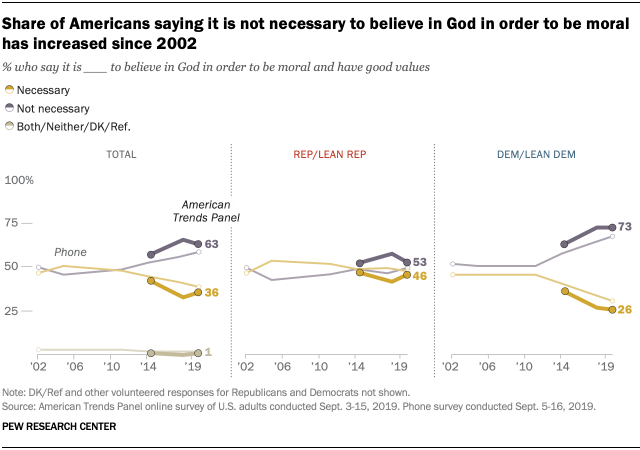Americans generally believe that women continue to face obstacles that make it more difficult for them to get ahead than men. While there are sizable gender differences in these opinions, the partisan divide is even more pronounced.
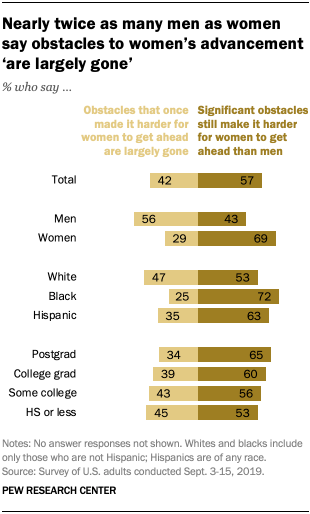
Overall, 57% of adults say that “significant obstacles still make it harder for women to get ahead than men.” About four-in-ten (42%) say that the obstacles that once made it harder for women to get ahead are largely gone.
The public’s views on whether it is more difficult for women to advance have changed modestly since 2016, when 53% of the public said women still face significant obstacles.
Men and women hold very different views on whether obstacles continue to stand in the way of women’s advancement: Nearly seven-in-ten women (69%) say there are still significant obstacles that make it harder for women to get ahead than men, compared with 43% of men.
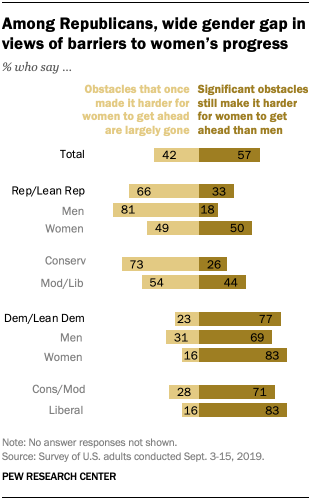
But the partisan differences are even wider: While 77% of Democrats and Democratic-leaning independents say significant obstacles continue to make it harder for women to get ahead, just a third of Republicans and Republican leaners say the same.
White adults (53%) are less likely than black (72%) and Hispanic (63%) adults to say significant obstacles remain that make it harder for women to get ahead than men. Black adults (25%) are the least likely to say the obstacles women face are largely gone.
While six-in-ten or more adults with postgraduate (65%) or college degrees (60%) say obstacles make it difficult for women to advance than men, about half of adults without a college degree (54%) say the same.
Combining gender and partisanship, Republican men stand out for their view that the obstacles standing in the way of women’s progress are largely gone. A large majority of Republican men (81%) say such obstacles are mostly a thing of the past. By contrast, Republican women are evenly divided: 49% say the obstacles to women’s progress are largely gone, while 50% say significant obstacles remain.
Gender differences among Democrats are not as stark, but a larger majority of Democratic women (83%) than men (69%) say significant obstacles still make it harder for women to advance.
Growing share of Democrats say it’s harder for women to advance
Since 2016, there has been a modest increase in the share of the public that says there are still obstacles that make it harder for women to get ahead than men. While 53% held this view three years ago, 57% now say there are still obstacles making it harder for women to advance.
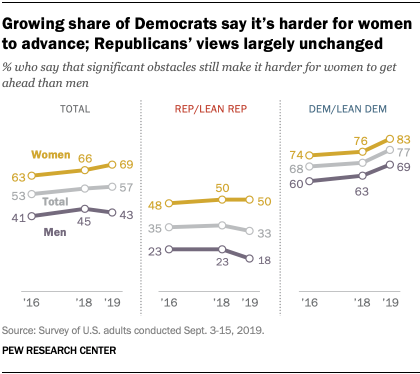
However, virtually all of the change has occurred among Democrats; Republicans’ views have remained stable.
Today, 77% of Democrats say significant obstacles continue to stand in the way of women’s progress, up from 68% three years ago. Since 2016, the shares of both Democratic women and men expressing this view have increased by 9 percentage points.
A third of Republicans say women still face significant obstacles, little changed from three years ago (35%). But the share of Republican men who say this has ticked down, from 23% in 2016 (and 2018) to 18% currently. Opinions among Republican women have remained fairly stable over this period (50% currently).
Only a third of Americans say society is better off prioritizing marriage and children
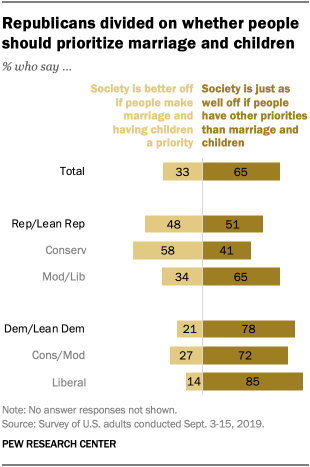
Nearly two-thirds of Americans (65%) say society is just as well off if people have priorities other than marriage and having children – a significant increase from the 57% who said this in 2016. The share of Americans saying society is better off if people prioritize marriage and children has decreased: 33% say this today, compared with 40% three years ago.
Overall, views among Republicans are split: 51% say society is just as well off with people having priorities other than marriage and children, while 48% say society is better off if people focus on marriage and having children.
Among Republicans, there are stark differences in these views by ideology. Nearly six-in-ten conservative Republicans (58%) say society is better off if people make marriage and children a priority, while roughly two-thirds of moderate and liberal Republicans (65%) say society is just as well off if people do not.
While nearly eight-in-ten Democrats (78%) say that society is just as well off if people have priorities other than getting married and having children, liberal Democrats (85%) are more likely than conservative and moderate Democrats (72%) to say this.
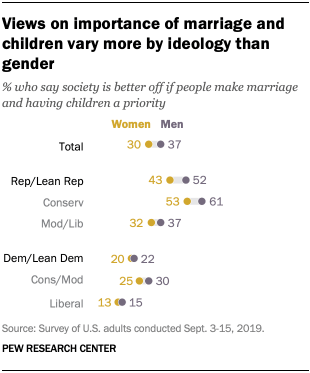
Overall, men (37%) are more likely than women (30%) to say that society is better off if people prioritize marriage and having children. However, these gender differences are much less pronounced than partisan and ideological differences on this question.
Among both Republican men and women, conservatives are much more likely than their moderate and liberal counterparts to say this. For example, 53% of conservative Republican women – compared with 32% of moderate and liberal Republican women – hold the view that people should prioritize starting a family, a difference of 21 percentage points.
Similarly, a far larger share of conservative Republican men (61%) than moderate and liberal Republican men (37%) say society would be better off if people prioritized marriage and having children.
Among Democrats, there are no significant gender differences in these views. Still, conservative and moderate Democratic men (30%) and women (25%) are about twice as likely to say people should prioritize marriage and children than their liberal Democratic counterparts (15% of liberal Democratic men and 13% of liberal Democratic women say this).
Most adults view legalization of same-sex marriage as positive step
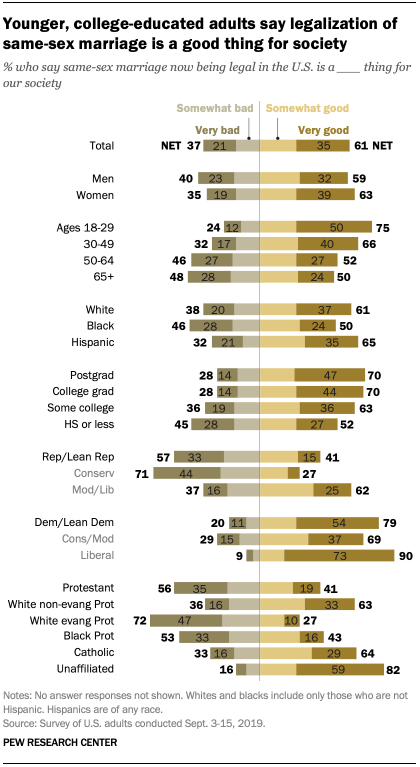
A majority of U.S. adults (61%) say that same-sex marriage being legal in the U.S. is a very good (35%) or somewhat good (25%) thing for society. About four-in-ten (37%) say legalization of same-sex marriage is bad, with 21% saying it is very bad.
Views of the effect of same-sex marriage on our society have grown more positive over the past year. In 2018, 56% of Americans said same-sex marriage now being legal in the U.S. was a good thing.
Over the past two decades, public support for allowing gays and lesbians to marry legally has increased dramatically. Earlier this year, 61% favored allowing gays and lesbians to marry legally.
As with support for same-sex marriage, opinions about its impact on our society differ by age, race, education, religion and partisanship.
Opinions about the effect of same-sex marriage have become more positive among members of both parties over the past year. Currently, 41% of Republicans and Republican-leaning independents say same-sex marriage has had a positive effect, up from 34% in 2018. Conservative Republicans continue to be far less likely than moderates and liberals in the GOP to have a positive view of legalization of same-sex marriage (27% and 62% respectively say it is a good thing).
Nearly eight-in-ten Democrats and Democratic leaners (79%) say the legalization of same-sex marriage has a been a good thing for our society; last year, 73% expressed this view. Although the ideological divide is less pronounced among Democrats than Republicans, liberal Democrats are more likely than conservative and moderate Democrats to say same-sex marriage is a good thing for society (90% vs. 69%).
A large majority of white evangelical Protestants (72%) and a smaller share of black Protestants (53%) say the legalization of same-sex marriage has been a bad thing for our society. By contrast, 63% of white non-evangelical Protestants say that same-sex marriage has been a good thing for our society.
Nearly two-thirds of Catholics say the legalization of same-sex marriage has been a very good (29%) or somewhat good (35%) thing for our society; 33% of Catholics say it has been a bad thing. Religiously unaffiliated adults are among the most positive about the impact of same-sex marriage: 82% say it has been a good thing for society.
Republicans differ by age in views of same-sex marriage; Democrats differ by education and race
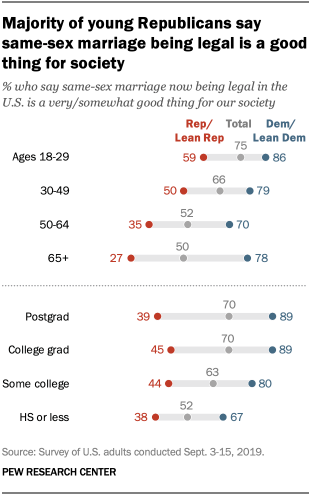
There are stark differences in views of same-sex marriage among Republicans, with relatively modest age differences in these views among Democrats. However, there are educational divides among Democrats in these views, as well as a wide gap between the views of white and black Democrats.
A clear majority of Republicans and Republican leaners under 30 (59%) say the legalization of same-sex marriage has been a good thing for society – the highest share of any GOP age group. Those ages 30 to 49 are split in their views (50% say legal same-sex marriage has been a good thing, 49% a bad thing). Republicans ages 50 and older are less likely to have a positive view: Just 31% say legal same-sex marriage is a good thing for society.
Among Democrats, 70% or more across all age groups say same-sex marriage now being legal is a good thing for society.
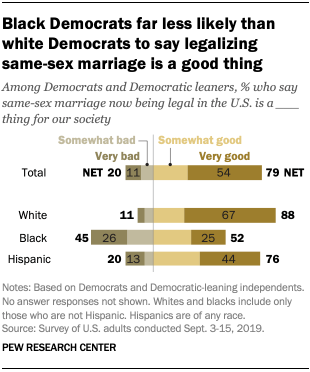
However, views among Democrats vary by education and race. Democrats with at least a bachelor’s degree (89%) are more likely than Democrats with no college experience (67%) to say same-sex marriage is a good thing for society.
Nearly nine-in-ten white Democrats (88%) say the legalization of same-sex marriage is good thing for society, compared with 76% of Hispanic Democrats and 52% of black Democrats. And while 67% of white Democrats say this development is very good for society, 44% of Hispanic Democrats and just 25% of black Democrats say the same.
Views on belief in God and morality
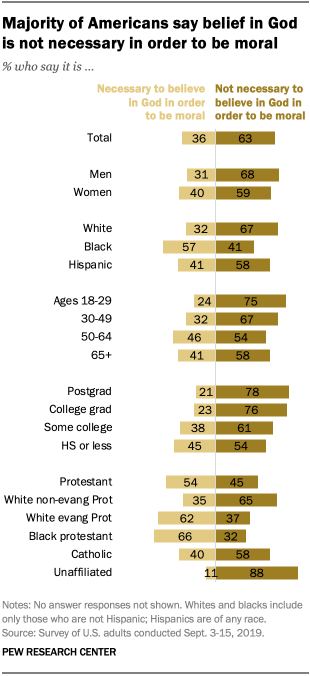
About six-in-ten Americans (63%) say it is not necessary to believe in God in order to be moral, while 36% say it is necessary to believe in God in order to be moral and have good values.
While majorities of white (67%) and Hispanic Americans (58%) say it is not necessary to believe in God in order to be moral, fewer black Americans (41%) say the same. Nearly six-in-ten black Americans (57%) say belief in God is necessary to be moral.
Majorities of adults across all age groups say that morality is not reliant on belief in God. However, adults under the age of 50 are more likely to say this (70% vs. 56% of those 50 and older).
Nearly half of adults with no more than a high school diploma (45%) say it is necessary to believe in God to be moral. That compares with 38% of those with some college experience but no degree and just 23% with more educational experience.
Similar shares of white evangelical Protestants (62%) and black Protestants (66%) say it is necessary to believe in God in order to be moral. But a large share of white non-evangelical Protestants (65%) say it is not necessary. A majority of Catholics (58%) and those without a religious affiliation (88%) also share this view.
Conservatives in both parties more likely to say belief in God is necessary to be moral
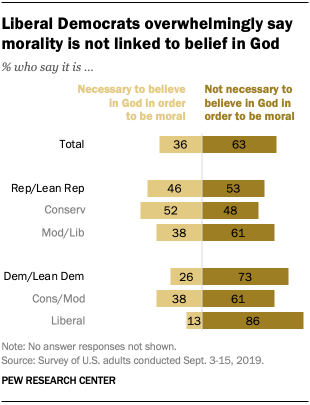
Although a majority of Americans say belief in God is not necessary for a person to be moral, there are sizable differences of opinion by partisanship and ideology.
Overall, a narrow majority of Republicans (53%) say it is not necessary to believe in God in order to be moral. Conservative Republicans are divided (52% say belief in God is necessary for morality, while 48% say it is not necessary), while a majority of moderate and liberal Republicans (61%) say morality is not contingent on belief in God.
Nearly three-quarters of Democrats (73%) say it is not necessary to believe in God in order to be moral, while 26% say this belief in God is necessary. Liberal Democrats particularly stand out for this view. An overwhelming majority of liberal Democrats (86%) say it is not necessary to believe in God in order to be moral and have good values; that compares with a smaller majority (61%) of conservative and moderate Democrats.
Among Democrats, wide racial and ethnic differences on belief in God and morality
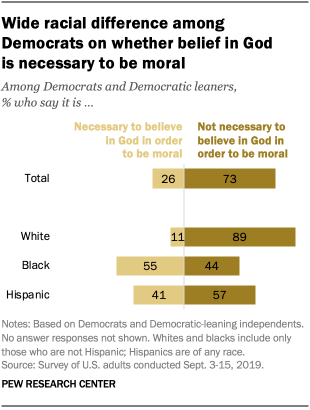
Among Democrats, there are stark racial and ethnic differences in the importance of belief in God for morality.
While roughly nine-in-ten white Democrats (89%) say it is “not necessary to believe in God in order to be moral,” a much narrower majority of Hispanic Democrats (57%) say the same. Among black Democrats, a 55% majority says it is necessary to believe in God in order to be moral, while 44% of black Democrats say that morality is not linked to belief in God.
Public divided in views of Islam and violence
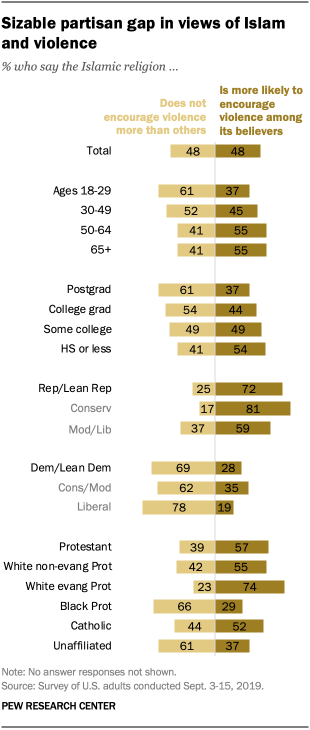
The public is evenly divided in opinions about whether the Islamic religion is more likely than others to encourage violence among its believers. About half of Americans say Islam is more likely than other religions to encourage violence among its believers, while as many say that the religion does not encourage violence more than others (48% each).
As in the past, partisanship is a major factor in these attitudes. By a wide margin (72% to 25%), Republicans say Islam is more likely to encourage violence. Democrats, by nearly the same margin (69% to 28%), say Islam does not encourage violence more than other religions.
There are also wide ideological divisions within partisan groups. Conservative Republicans (81%) are more likely than moderate and liberal Republicans (59%) to say Islam encourages violence among its believers. Among Democrats, a greater share of liberal Democrats than conservative and moderate Democrats say Islam does not encourage violence more than other religions (78% vs. 62%).
These views also differ by age, level of educational attainment and religion. A majority of those under age 50 (55%) say Islam does not encourage violence more than other religions; 55% of those 50 and older say it is more likely to encourage violence.
Adults with postgraduate degrees (37%) are less likely to say that Islam encourages violence than those with a bachelor’s degree (44%), some college experience (49%) or those with a high school diploma or less education (54%).
Two-thirds of white Protestants – 55% of white non-evangelical Protestants and 74% of white evangelical Protestants – say Islam is more likely to encourage violence among its believers. However, black Protestants are more likely to say the opposite: 66% say Islam does not encourage violence more than other religions.
Among Catholics, more say that the Islamic religion encourages violence (52%) than say that it does not (44%). About six-in-ten of those who are not affiliated with a religion (61%) say the Islamic religion does not encourage violence more than other religions; 37% of those in this group say Islam does encourage violence.
Long-term opinion trends: Views of Islam and violence, importance of belief in God
In recent years, Pew Research Center has transitioned from probability-based telephone surveys to the American Trends Panel, a probability-based online panel. The transition from phone surveys conducted with an interviewer to online self-administered surveys brings with it the possibility of mode differences – differences arising from the method of interviewing.
This section includes opinion measures on whether Islam is more likely than other religions to encourage violence and whether it is necessary to believe in God to be a moral person. Both questions, which have long-standing telephone trends, were included on a survey conducted in September on the American Trends Panel (ATP), on which this report is largely based, and a contemporaneous telephone survey.
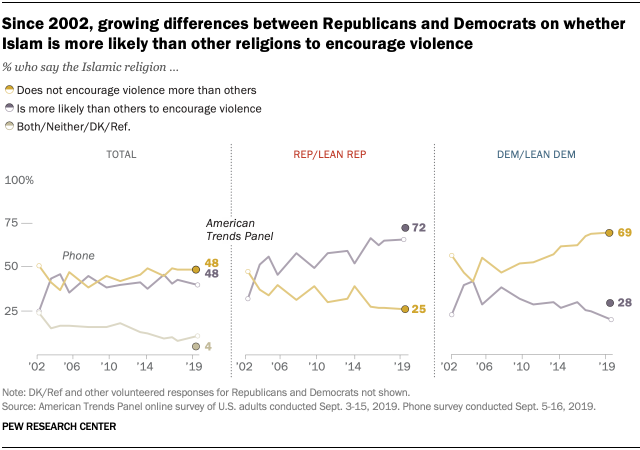
On the American Trends Panel, 48% say the Islamic religion is more likely than others to encourage violence among its followers, while an identical share says it is not. On the telephone survey, 40% say Islam is more likely to encourage violence, while 49% say it is not. As is typically the case, the share offering no opinion is much higher on the phone survey (11%) than on the online survey (just 4%).
There are wide partisan differences evident in both modes. The telephone trend shows that these differences have increased substantially since the question was first asked in 2002. On the American Trends Panel survey, 72% of Republicans and Republican leaners say the Islamic religion encourages violence more than other religions, compared with just 28% of Democrats and Democratic leaners. The partisan gap in the shares in each party saying Islam is more likely to encourage violence is similar on the ATP (44 percentage points) and the contemporaneous phone survey (46 points).
On the American Trends Panel survey, 63% say it is not necessary to believe in God to be moral; 36% say belief in God is necessary for morality. A majority (59%) on the phone survey says belief in God is not necessary to be moral, while 39% say it is necessary.
Partisan differences on this question also have widened in recent years. In the survey conducted on the ATP, 73% of Democrats and Democratic leaners say belief in God is not a prerequisite for being moral and having good values, while 53% of Republicans and GOP leaners say the same. This partisan gap was much narrower a decade ago.
